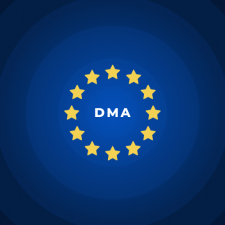Developers have avoided privacy regulations like the GDPR for a long time. However, the upcoming Digital Markets Act in the EU is a game-changer. This means it’s time to take user consent seriously.
Regulators have been trying to improve user privacy in the digital content industry for years, with some success. But many creators still disregard the rules. The EU’s Digital Markets Act (DMA) is different because it targets gatekeepers rather than individual developers. This means that tech giants like Apple and Google will enforce compliance from any developer using their platforms.
This has led to what mobile insiders are calling DMArmageddon.
But is it really the end of the world for app developers? Can they make small changes and come out stronger after complying?
We believe they can. The key is to use an in-game Consent Management Platform (CMP) to follow the rules and build a large, trusting audience.
…game publishers have mostly ignored these rules.
Staying Ahead of the Gatekeepers
Before we dive into the details, let’s understand what the EU Digital Markets Act is and why it’s such a crucial regulation.
The DMA became law in November 2022 and will be enforced as of March 2024. The EU introduced this law to address concerns about the growing power of big tech gatekeepers and the potential for abuse in digital markets. The DMA includes provisions on privacy and requires gatekeepers like Apple and Google to obtain explicit consent for the collection and usage of personal data from European citizens.
This also applies to third parties, including mobile apps and games developers who use their platforms.
Digital Markets Act and User Consent: A Serious Matter
While this isn’t the first time regulators have implemented privacy laws, it’s worth noting that game publishers have largely disregarded these rules. An industry survey conducted in April 2023 found that 90 percent of mobile developers did not comply with privacy regulations, despite the threat of substantial fines for noncompliance.
Can they afford to ignore the DMA in the same way? No, they cannot. This time, gatekeepers will ensure compliance for third parties using their platforms for advertising and other critical functions.
They are taking the law extremely seriously. For instance, Google recently mandated that all publishers serving ads to EU, EEA, and UK users must use a Google-certified Consent Management Platform. This sudden urgency is due to the EU’s promise to fine gatekeepers up to 10 percent of their annual revenue if they breach the DMA, which could amount to billions of dollars for companies like Google.
Given the potential repercussions, gatekeeper companies are unlikely to take any risks. They have the power to remove non-compliant third parties from their platforms, affecting ad revenue, audience access, and critical data.
Hence the term ‘DMArmageddon.’
…an industry survey from April 2023 found that 90 percent of mobile developers failed to comply with privacy regulations.
Furthermore, the DMA is not the only regulatory change that app developers need to prepare for. Legislators in other parts of the world are rolling out similar privacy protections, and Gartner predicts that by the end of 2024, 75 percent of the world’s population will have their data and privacy protected by regulation.
It’s clear that game developers must start taking user consent seriously. Where should they begin?
Google’s Response: Unveiling Consent Mode
As DMArmageddon approaches, developers will seek guidance from gatekeepers on how to navigate the upcoming changes. Google has taken the lead by introducing Google Consent Mode (V2) to help app developers, especially those relying on Google Firebase for Analytics, prepare for the impending privacy challenges.
Google Consent Mode indicates whether consent has been granted for Google Analytics and Google Ads cookies. By integrating this feature, developers can align their applications with the principles of the Digital Markets Act while maintaining the functionality of their Google tools.
Digital Markets Act: Key Steps for App Developers
The DMA is almost here, and developers cannot afford to procrastinate. We recommend two simple steps to prepare:
- Implemement Google Consent Mode immediately, especially if you use Google Firebase for Analytics. This proactive step will help ensure continued access to analytics services and strengthen compliance with evolving privacy regulations.
- Consider using a certified consent management platform (CMP). The best CMPs are designed to automatically comply with Google DMA requirements. Usercentrics is one of Google’s officially-sanctioned CMPs, certified for use by publishers serving ads to users in the EU, EEA or UK.
Remember, the DMA and Consent Mode are just the beginning of a broader privacy clampdown. More changes are on the horizon, such as Apple’s new privacy features and Android Privacy Sandbox, so it’s essential to be prepared.
So, while DMArmageddon is on the horizon, there’s no need to despair. Instead, prioritize privacy in your strategy. You can avoid the end of the world and embark on a new and secure future.


